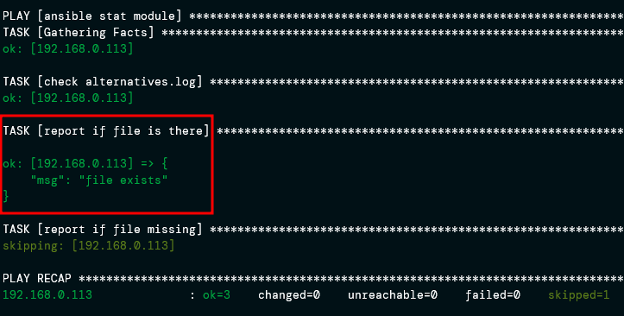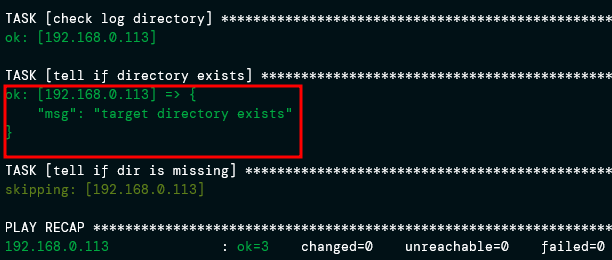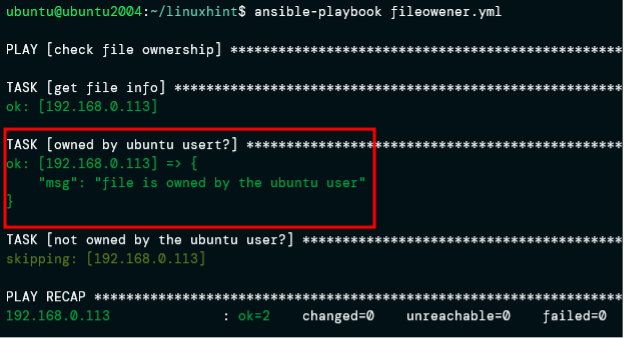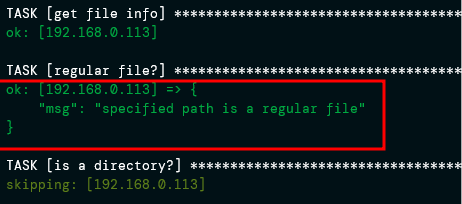Ansible, considered the most diverse and popular automation tool, provides a module for fetching file and file system information as native Linux stat command.
In this guide, we will understand how to work with the stat module in Ansible playbooks.
Check if File Exists
The stat module will fetch information about a specified file or directory and save it using the register parameter.
In the following example playbook, we check if the file /var/log/alternatives.log exists.
- name: ansible stat module
hosts: all
become: yes
tasks:
- name: check alternatives.log
stat:
path: /var/log/alternatives.log
register: info
- name: tell if the file is there
debug:
msg: file exists
when: info.stat.exists
- name: tell if file missing
debug:
msg: the file missing
when: not info.stat.exists
In the example above, we call the stat module to gather info about the file /var/log/alternatives.log from the remote host.
Once we retrieve the file information, we save it to a register file_info.
To ensure we can read the file, we set the become parameter to true.
In the second task, we use the info register to check if the file exists. If true, we display a message indicating the target file exists.
The final task returns a notification if the file does not exist on the remote host. This is facilitated if the info.stat.exist is false.
Save and run the playbook:
Here is an example output:
The output shows the target file exists on the remote host.
Check if a Directory Exists
The playbook to check if a directory exists using the stat module is similar to the one shown above. However, we provide a path to a target directory as shown below:
- name: ansible stat module
hosts: all
become: yes
tasks:
- name: check log directory
stat:
path: /var/log/
register: dir_info
- name: tell if directory exists
debug:
msg: target directory exists
when: dir_info.stat.exists
- name: tell if dir is missing
debug:
msg: directory is missing
when: not dir_info.stat.exists
Once we run the playbook, we should see an output similar to the one shown below:
Check if a user owns a file
The ansible stat module returns a collection of values for the specified file or directory. One such return variable is pw_name; this variable returns the username of the target file or directory owner.
We can create a playbook that returns a message if a specific username owns the specified file. For example:
- name: check file ownership
hosts: all
gather_facts: no
become: yes
tasks:
- name: get file info
stat:
path: /var/log/kern.log
register: file_info
- name: owned by ubuntu usert?
debug:
msg: file is owned by the ubuntu user
when: file_info.stat.pw_name != 'ubuntu'
- name: not owned by the ubuntu user?
debug:
msg: file is not owned by the ubuntu user
when: not file_info.stat.pw_name != 'ubuntu'
In the example above, we check if the ubuntu user owns the file /var/log/kern.log. If true, we return an appropriate message.
Below is an example output:
Check file type
Another return value of the stat module allows us to check the file type. Using return values such as isreg and isdir, we can check if a file is a directory:
- name: check file type
hosts: all
become: ye
tasks:
- name: get file info
stat:
path: /var/log/kern.log
register: file_info
- name: regular file?
debug:
msg: specified path is a regular file
when: file_info.stat.isreg
- name: is a directory?
debug:
msg: specified path is a directory
when: file_info.stat.isdir
Save and run the playbook as:
Ansible stat return values
The following are the values returned by the ansible stat module:
- attributes – Returns the attributes of the specified file.
- executable – Returns true if the invoking user has executed permissions on the target path.
- exists – Returns true if the specified path exists.
- gr_name – Returns the name of the group of the file owner.
- islbk – Returns true if the specified file is a block device
- ischr – Returns true if the specified file is a character file.
- isreg – Returns true if the specified file is a regular file
- isdir – Returns true if the specified file is a directory.
- islnk – Returns true if the target file is a link
- mode – Returns the file permission in octal notation
Those are some return information of the ansible stat module. Check the documentation to learn more.
Conclusion
In this guide, we discussed how to use the ansible stat module to gather information about files and file systems.




